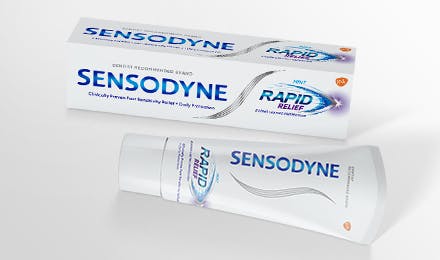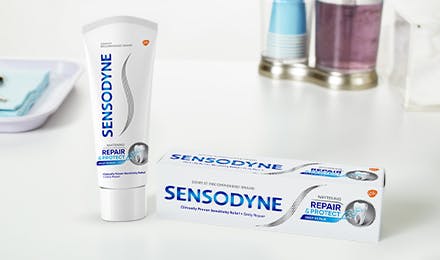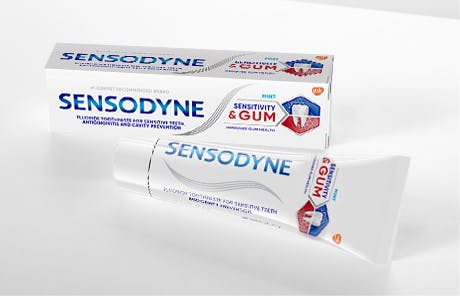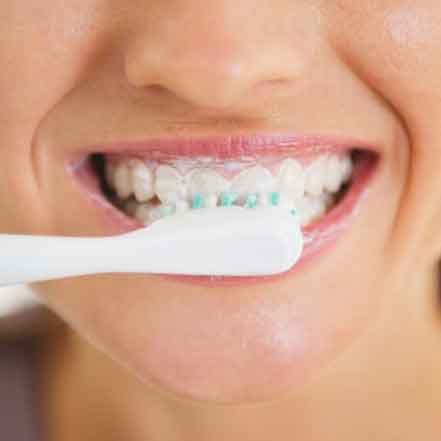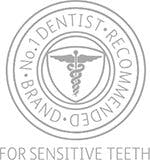Are Your Teeth Sensitive to Sugar?

Teeth sensitive to sugar? Explore this article from Sensodyne to find out why—and what you can do to make it better!
Sweets and Tooth Sensitivity
Cupcakes, ice cream, and cookies—there are many delicious desserts to be enjoyed! But while desserts are a sweet addition to our lives, they can cause tooth sensitivity. People of all ages, genders, and backgrounds can experience sensitive teeth.1 If you have sensitive teeth, there are things you can do to help. Read on to learn more about causes of sensitive teeth and how you can manage the situation, so that you can still enjoy your favorite treats in moderation.
Causes of Sensitive Teeth
If your teeth hurt when eating sweets, there may be an underlying oral health issue causing the discomfort. There are many causes of sensitive teeth, and a few of the most common include:
- Brushing too hard and/or brushing from side to side can wear down enamel
- Consuming acidic foods and drinks can cause loss of tooth enamel and gum recession
- Gum disease, which is caused by a build-up of plaque or tartar
- Tooth grinding can wear down the enamel of the teeth
- A cracked tooth or filling
- Cavities
- Tooth bleaching and whitening treatments1
The When and Why of Tooth Sensitivity
Not everyone experiences tooth sensitivity in the same way. In your case, you may be experiencing teeth sensitive to sweets. However, individuals can also have sensitivity while consuming hot, cold, or acidic food and beverages.1 Sensitivity may be mild or more pronounced, and in some cases you may experience pain as well.1
In many cases, the reason for tooth sensitivity comes down to underlying oral health issues, including enamel wear and exposed dentin.1 Talk your dentist if you’re experiencing tooth sensitivity to determine the reason why you’re experiencing discomfort.
What Do Sensitive Teeth Feel Like?
Sensitive teeth may feel uncomfortable, or even painful. You may experience sharp, temporary discomfort or pain after certain activities such as eating, drinking, or brushing your teeth.2 Temperature can cause sensitivity, so you may notice pain after drinking an icy beverage or breathing in cold air. In addition to sugary foods, you may find that fizzy or acidic beverages can trigger your tooth sensitivity.1
What Treatments Are Available for Sensitive Teeth?
If you have sensitive teeth, you don’t have to live with the discomfort. There are treatments available to potentially help improve your situation. Using a special toothpaste, such as a desensitizing toothpaste or toothpaste with fluoride, may help you depending on your specific oral health needs.2 A desensitizing treatment could be applied by your dentist if he or she feels it’s appropriate.2 Surgical gum grafts are an option for if you’ve lost gum tissue, and in some cases, your dentist may recommend a root canal if other treatments have been ineffective.2
Treatment for sensitive teeth—including teeth sensitive to sweets—depends on the cause of the sensitivity and differs for each individual.
How to Manage Teeth Sensitive to Sugar
If your teeth hurt during or after eating sweets, schedule an appointment to talk with your dentist. While tooth sensitivity isn’t necessarily uncommon, it may be a sign you have a problem with your teeth or gums. Determining the cause of your sensitivity is the first step you should take in order to start getting the issue under control.
There are a few other things you can do to help manage sensitive teeth. Explore our other tips for people with teeth sensitive to sugar below:
- Limit your sweets intake. While we typically associate sugar with decadent sweet treats, sugar can also hide in foods like cereals, soups, juices, and salad dressings. Too much sugar can negatively impact your health in other ways too, so eating less sugar may help oral health and your overall health.
- You might already know how to brush your teeth properly, but it can’t hurt to refresh your memory on proper brushing techniques. Not only will brushing your teeth the right way help prevent teeth cavities and plaque build-up, but by using a gentle technique, you’ll also potentially avoid discomfort and pain.
- Make toothpaste for sensitive teeth and cavity prevention a part of your oral health care routine. Sensodyne Pronamel Multi-Action helps relieve tooth sensitivity and protects enamel.
Teeth sensitive to sweets are no fun! But by talking to your dentist, using sensitive teeth products, and practicing a good oral health care routine, your teeth will be better protected from discomfort or pain.
SOURCES
By clicking any of the links below you will be taken to an external website that is independently operated and not managed by GSK. GSK assumes no responsibility for the content on the website. If you do not wish to leave this website, do not click on the links below.


